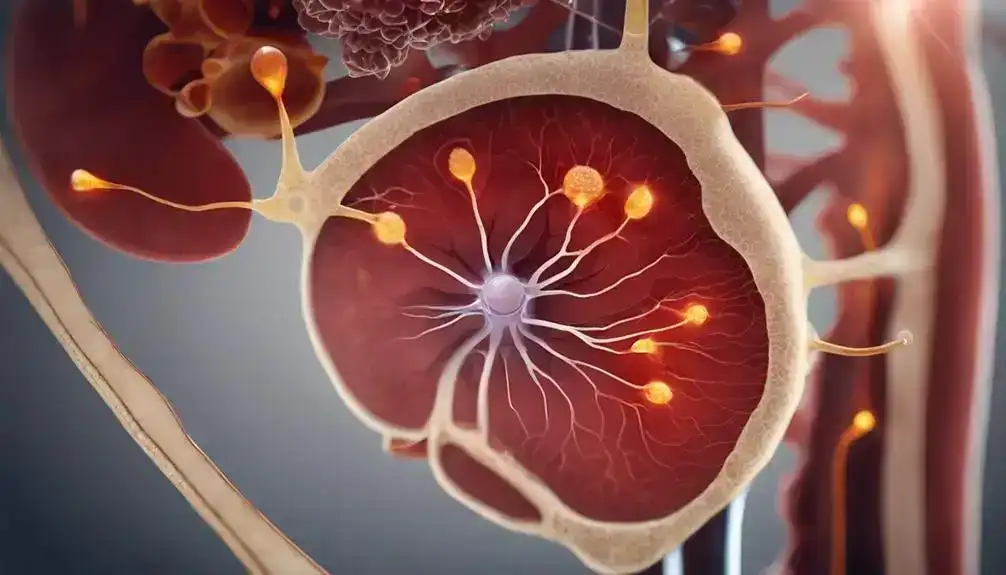Coffee’s caffeine content can notably impact kidney stone formation, potentially reducing the risk by up to 40%. The diuretic effect of caffeine in coffee aids in increasing urine output, altering urinary composition to reduce the likelihood of stone development.
Population-based and Mendelian randomization studies support the protective role of caffeine against kidney stones. Understanding coffee brewing techniques and bean origins can further enhance these benefits.
Incorporate moderate coffee consumption, alongside personalized healthcare advice, for kidney stone prevention. Discover how coffee caffeine’s unique properties contribute to managing kidney stone risk.
What Are Kidney Stones and Their Causes?

Kidney stones are hard mineral deposits that can form in the kidneys or urinary tract due to factors like diet, medical conditions, and lifestyle choices.
Understanding the different types of kidney stones, such as calcium oxalate or uric acid stones, and recognizing their causes and risk factors, which include dietary habits and certain health conditions, is crucial for prevention and management.
Different Types of Kidney Stones
Kidney stones can vary in composition, leading to different types with unique causes and characteristics. Understanding these distinctions is essential in implementing targeted prevention strategies.
The main types of kidney stones include:
- Calcium Oxalate Stones
- Uric Acid Stones
- Struvite Stones
Calcium Oxalate Stones
One common type of kidney stones is formed when calcium combines with oxalate in the urine. This type of stone can be prevented by staying hydrated and reducing oxalate-rich foods.
Preventive measures against calcium oxalate stones include maintaining adequate hydration levels and limiting foods high in oxalate content.
Following these Dietary recommendations can help reduce the risk of developing calcium oxalate kidney stones.
Uric Acid Stones
When considering the different types of kidney stones, it’s essential to understand the formation and characteristics of uric acid stones.
Dietary modifications, such as reducing high-protein intake, and lifestyle changes can help prevent the formation of uric acid stones.
Making adjustments to your diet and habits can lower the acidity of urine, reducing the risk of developing these types of kidney stones.
Struvite Stones
To understand the distinct characteristics of kidney stones, it’s important to recognize the formation and attributes of struvite stones. Struvite stones are typically linked to urinary tract infections and can grow rapidly.
Preventative measures include treating the underlying infection and ensuring adequate hydration. Treatment options often involve antibiotics to address the infection and may require surgical intervention to remove the stones efficiently.
Cystine Stones
Cystine stones are a rare type of kidney stones that form in individuals with a hereditary disorder known as cystinuria. Prevention of cystine stones involves dietary management to reduce cystine levels in urine.
Increasing fluid intake, moderating protein intake, and possibly using medications can aid in preventing the formation of cystine stones.
Consult a healthcare provider for personalized advice on managing cystinuria and preventing cystine stone development.
Causes and Risk Factors for Kidney Stones
When considering the causes and risk factors for kidney stones, you should pay attention to your dietary habits, certain medical conditions you may have, and your lifestyle choices.
- Dietary Factors: High intake of protein, sodium, and sugar can increase the risk of kidney stones.
- Medical Conditions: Conditions like obesity, diabetes, and certain infections can also elevate your risk.
- Lifestyle Factors: Lack of physical activity, dehydration, and a sedentary lifestyle can contribute to the formation of kidney stones.
Dietary Factors
Regularly consuming a diet high in protein, sodium, and sugar can increase your risk of developing certain types of kidney stones. Managing oxalate intake and moderating protein consumption are key factors in preventing stone formation.
High oxalate-rich foods can contribute to stone development, emphasizing the importance of a balanced diet to reduce the risk of kidney stones.
Be mindful of your dietary choices to maintain kidney health and prevent complications.
Medical Conditions
Medical conditions such as obesity, diabetes, and hyperparathyroidism greatly increase the likelihood of kidney stone development. Treatment options for kidney stones include lifestyle modifications and surgical procedures if necessary.
Patient education plays an important role in preventing and managing kidney stones. Lifestyle modifications, such as maintaining a balanced diet and staying hydrated, are essential in reducing the risk of kidney stone formation.
Understanding the impact of medical conditions on kidney stone risk is key to effective prevention strategies.
Lifestyle Factors
To reduce your risk of kidney stones, lifestyle factors such as hydration habits, exercise routines, and dietary choices play an essential role.
Ensuring adequate hydration by drinking plenty of fluids, engaging in regular physical activity, and maintaining a balanced diet rich in fruits and vegetables can help prevent the formation of kidney stones.
Moderating caffeine intake and avoiding dehydration are key steps in reducing your risk.
How Does Coffee Caffeine Affect Kidney Stone Formation?

Caffeine from coffee influences kidney stone formation by increasing urine output, aiding in the dilution of stone-forming substances in your urine.
Additionally, Caffeine alters the composition of urine, affecting the concentration of minerals that contribute to stone development.
When considering caffeine sources, coffee stands out as particularly beneficial compared to other beverages in reducing the risk of kidney stone formation.
The Diuretic Effect of Caffeine in Coffee
Enhancing your understanding of how coffee caffeine influences kidney stone formation involves recognizing the diuretic effect of caffeine and its impact on urinary composition. Caffeine’s significant properties lead to increased urine output, aiding in the dilution of stone-forming substances in the urine.
This increased urine volume helps reduce the concentration of minerals like calcium oxalate and uric acid, lowering the risk of kidney stone formation. Additionally, Caffeine can alter urinary pH, potentially creating an environment less conducive to stone formation.
Changes in Urinary Composition Due to Caffeine
When you consume caffeine, particularly from coffee, it leads to increased urine volume, helping to dilute substances that contribute to kidney stone formation. Additionally, Caffeine can impact the excretion of calcium in urine, potentially reducing the risk of calcium oxalate stone formation.
The changes in urinary composition caused by caffeine play a vital role in mitigating the factors that contribute to kidney stone development.
Increased Urine Volume
By increasing urine volume, coffee caffeine plays a significant role in diluting substances that contribute to kidney stone formation. This process, driven by caffeine’s diuretic properties, aids in flushing out stone-forming compounds like calcium oxalate and uric acid.
Hydration benefits from increased urine output help mitigate dehydration risks, supporting kidney health. Understanding caffeine metabolism and maintaining adequate fluid intake can optimize the protective effects of coffee against kidney stones.
Calcium Excretion and Its Effects
Increasing urine volume through coffee caffeine consumption can lead to higher calcium excretion in the urine, ultimately contributing to a reduced risk of kidney stone formation.
Caffeine’s significance lies in its ability to alter urine composition, diluting stone-forming substances like calcium oxalate and uric acid.
Comparing Caffeine Sources: Coffee vs. Other Beverages
When evaluating caffeine sources for their impact on kidney stone formation, it’s crucial to take into account the unique characteristics of coffee, tea, and other caffeinated beverages. The table below highlights key differences in how these beverages affect urinary composition and kidney stone risk. Understanding these distinctions can help you make informed choices to reduce your risk of kidney stone formation.
| Caffeine Source | Effect on Kidney Stone Risk |
|---|---|
| Coffee | Offers protective benefits due to diuretic properties and additional compounds like citric acid. |
| Tea | Can increase urine volume but consider its oxalate content for those at risk of oxalate stones. |
| Other caffeinated beverages | May contain caffeine but often come with added sugars and other substances that could be detrimental for kidney stone prevention. |
Coffee
Coffee, compared to other caffeinated beverages, offers unique benefits in reducing kidney stone risk due to its composition and additional compounds. Brewing techniques and coffee bean origins play a role in these benefits.
The diuretic properties of caffeine in coffee help dilute substances in urine that contribute to stone formation. Additionally, compounds like citric acid found in coffee can aid in preventing kidney stones, making it a favorable choice for stone prevention.
Tea
Tea, like coffee, contains caffeine and offers potential benefits in reducing kidney stone risk, although its oxalate content should be considered for those at risk of oxalate stones.
When comparing caffeine sources, tea’s benefits lie in increasing urine volume. However, individuals susceptible to oxalate stones should be cautious due to tea’s oxalate content.
Understanding the nuances of caffeine sources can aid in kidney stone prevention strategies.
Other Caffeinated Beverages
Considering the potential impact on kidney stone formation, it’s essential to evaluate the effects of caffeine from other caffeinated beverages apart from coffee and tea.
Energy drinks, when compared, may pose health risks due to their high caffeine content.
Soda consumption, often containing added sugars, can contribute to kidney stone formation, highlighting the importance of understanding the impact of different caffeinated beverages on kidney health.
What Are the Research Insights on Coffee Caffeine and Kidney Stones?
Research insights on coffee caffeine and kidney stones reveal significant associations between caffeine intake and reduced kidney stone risk in population-based studies.
Mendelian randomization studies further support the protective role of caffeine against kidney stones.
Laboratory studies provide mechanistic insights into how caffeine, particularly from coffee, can prevent kidney stone formation through various pathways.
Findings from Population-Based Studies
When considering the research insights on coffee caffeine and kidney stones, you should pay attention to key findings from large-scale population-based studies.
The National Health and Nutrition Examination Survey (NHANES) has contributed valuable data linking caffeine intake to a reduced risk of kidney stones.
The Health Professionals Follow-Up Study (HPFS) is another significant study that has provided evidence supporting the protective role of caffeine, particularly from coffee, in kidney stone prevention.
The Nurses’ Health Studies (NHS) I and II have also contributed valuable data linking caffeine intake to a reduced risk of kidney stones.
These studies offer significant evidence supporting the protective role of caffeine, particularly from coffee, in kidney stone prevention.
National Health and Nutrition Examination Survey (NHANES)
Analyzing data from the National Health and Nutrition Examination Survey (NHANES) reveals a significant correlation between higher caffeine consumption and a decreased risk of kidney stones, especially among specific demographics.
NHANES data supports the notion that increased caffeine intake is associated with a lower likelihood of developing kidney stones.
Understanding these findings can guide dietary choices to potentially reduce the risk of kidney stone formation.
Health Professionals Follow-Up Study (HPFS)
Data from the Health Professionals Follow-Up Study (HPFS) demonstrates a significant association between higher caffeine intake and a marked reduction in the risk of developing kidney stones among health professionals.
The study highlights the benefits of coffee consumption in lowering the likelihood of kidney stone formation.
These findings underscore the positive impact of caffeine intake on kidney health, emphasizing the potential health advantages of moderate coffee consumption.
Nurses’ Health Studies (NHS) I and II
The Nurses’ Health Studies (NHS) I and II provide valuable insights into the relationship between caffeine intake, particularly from coffee, and the risk of kidney stone formation among women.
These studies confirm that women who consume more caffeine have a reduced risk of developing kidney stones.
The NHS benefits from large-scale data, highlighting the protective effects of caffeine consumption, especially from coffee, in preventing kidney stone formation among female participants.
Insights from Mendelian Randomization Studies
When looking at research insights on coffee caffeine and kidney stones, the findings from Mendelian Randomization Studies offer valuable information. These studies utilize genetic data to establish causal relationships, shedding light on the benefits of caffeine intake.
The UK Biobank supports the notion that increased caffeine consumption is associated with a reduced risk of kidney stones.
The FinnGen Study also aligns with these findings, showing a correlation between higher caffeine intake and a decreased likelihood of developing kidney stones.
UK Biobank
In the UK Biobank study, genetic data supported the protective role of caffeine against kidney stones by linking higher coffee consumption with a reduced risk.
The analysis from the UK Biobank highlighted the benefits of caffeine in decreasing the likelihood of kidney stone formation.
This research insight adds to the growing body of evidence supporting the positive impact of caffeine, particularly from coffee, on kidney stone prevention.
FinnGen Study
The FinnGen Study further supports previous research by revealing a continued link between higher coffee-derived caffeine consumption and decreased kidney stone risk through its diuretic properties.
Genetic analysis in this study reinforces the protective role of caffeine against kidney stones, aligning with earlier findings.
These insights underscore the importance of coffee consumption in potentially reducing the likelihood of kidney stone formation.
Laboratory Studies on Caffeine’s Effects
When examining laboratory studies on caffeine’s effects in relation to kidney stones, one key point to take into account is calcium oxalate crystal adhesion. Research has shown that caffeine can reduce the adhesion of calcium oxalate crystals in the kidneys, potentially playing a role in preventing the formation of kidney stones.
Understanding this mechanism sheds light on how caffeine, particularly from sources like coffee, may offer protective benefits against kidney stones.
Calcium Oxalate Crystal Adhesion
Caffeine has been demonstrated to reduce the adhesion of calcium oxalate crystals in the kidneys, potentially preventing the formation of kidney stones. By preventing adhesion, caffeine plays an essential role in hindering crystal formation, thereby lowering the risk of developing kidney stones.
Understanding this mechanism sheds light on the protective effects of caffeine, particularly from sources like coffee, in maintaining kidney health.
How Can You Reduce Kidney Stone Risk with Coffee Caffeine?

You can reduce your kidney stone risk by leveraging the protective benefits of caffeine found in coffee.
Incorporating coffee into your daily routine can help prevent kidney stones by taking advantage of caffeine’s diuretic properties.
Combining coffee consumption with a balanced diet and adequate fluid intake can further enhance the preventive effects against kidney stones.
Protective Benefits of Caffeine from Coffee
To reduce your risk of kidney stones with coffee caffeine, consider the following points:
- Gender Differences in Caffeine’s Effects
- Weight and caffeine sensitivity
- Racial Variations in Caffeine Benefits
Gender Differences in Caffeine’s Effects
Gender variations play a significant role in how caffeine from coffee offers protective benefits against kidney stones. Research indicates that women tend to benefit more from caffeine’s effects in reducing kidney stone risk compared to men.
Gender disparities in caffeine consumption and its impact on urinary composition suggest that women may experience a greater reduction in kidney stone formation through increased caffeine intake from sources like coffee.
Weight and Caffeine Sensitivity
Weight and caffeine sensitivity play crucial roles in determining the extent to which coffee caffeine can reduce the risk of kidney stone formation.
Non-overweight individuals may experience a more significant reduction in kidney stone risk from caffeine.
Understanding your body’s response to caffeine and maintaining a healthy weight through proper weight management can enhance the protective benefits of caffeine from coffee against kidney stones.
Racial Variations in Caffeine Benefits
Racial variations in responses to caffeine from coffee can influence the degree of protective benefits against kidney stone formation. Ethnic disparities play a role in how different racial groups may experience the protective effects of caffeine.
Research suggests that white individuals are more likely to benefit from caffeine’s protective properties against kidney stones compared to nonwhite individuals. Understanding these caffeine benefits across diverse ethnicities is essential in optimizing kidney stone prevention strategies.
Dietary Tips for Kidney Stone Prevention
To reduce your risk of kidney stones with coffee caffeine, consider these dietary tips:
- Increase Fluid Intake
- Maintain a Balanced Diet
- Moderate Caffeine Intake
Increasing Fluid Intake
Increasing fluid intake, especially through consuming beverages like coffee, is an essential dietary strategy for reducing the risk of kidney stones. Hydration benefits include maintaining proper fluid balance, which helps prevent the buildup of minerals and salts that contribute to stone formation.
Maintaining a Balanced Diet
Maintaining a balanced diet is essential in complementing the benefits of caffeine from coffee for preventing kidney stones.
To reduce the risk, focus on nutritional balance and dietary moderation.
A diet rich in fruits, vegetables, and low in animal proteins can enhance the protective effects of caffeine.
Moderating Caffeine Intake
Monitoring your caffeine intake, especially from coffee, is essential for reducing kidney stone risk. health considerations suggest that while caffeine can be beneficial, moderation is key.
To optimize kidney stone prevention, balance caffeine consumption with other dietary factors. Incorporating coffee into a balanced diet rich in fruits and vegetables can enhance the protective effects of caffeine.
Remember to consult healthcare providers for personalized advice on caffeine intake and kidney stone prevention.
Practical Tips for Coffee Drinkers to Prevent Kidney Stones
To prevent kidney stones as a coffee drinker, consider these practical tips:
- Adding Coffee to a Kidney Stone Prevention Diet: Incorporating coffee into your daily routine can be an effective strategy to prevent kidney stones.
- Balancing Coffee Caffeine with Overall Health: Guarantee that coffee consumption is balanced with other health considerations to maintain overall well-being.
- Consulting Healthcare Providers for Personalized Advice: Seek advice from healthcare providers to tailor caffeine intake and other dietary habits to individual health needs.
Adding Coffee to a Kidney Stone Prevention Diet
Incorporating coffee into your daily dietary regimen can be a practical and effective measure for preventing kidney stones. Coffee consumption has been linked to reduced kidney stone risk due to its diuretic properties and impact on urinary composition.
To maximize preventive benefits, consider moderate coffee intake alongside adequate hydration to dilute urine and reduce stone-forming substances.
Additionally, complement coffee consumption with a balanced diet rich in fruits and vegetables while moderating animal protein intake. These preventive measures can enhance the protective effects of caffeine against kidney stones.
Remember to consult with healthcare providers for personalized advice on incorporating coffee and other dietary habits to suit your individual health needs.
Balancing Coffee Caffeine with Overall Health
Balancing your coffee caffeine consumption with overall health considerations is crucial for maximizing the preventive benefits against kidney stones. Health considerations should include monitoring your caffeine intake to avoid excessive consumption, which can lead to negative effects on your overall well-being.
It’s essential to make mindful lifestyle choices by incorporating coffee into a balanced diet that’s rich in fruits and vegetables while being moderate in animal proteins. Maintaining a dietary balance is key to optimizing the protective effects of caffeine in preventing kidney stones.
Consulting Healthcare Providers for Personalized Advice
Consult with healthcare providers for personalized guidance on optimizing your coffee consumption to effectively prevent kidney stones.
Seeking guidance from healthcare professionals can help tailor your caffeine intake to your specific health needs. Personalized consultation guarantees that your coffee consumption aligns with your overall well-being and kidney stone prevention goals.
Healthcare providers can offer evidence-based recommendations on the amount of caffeine that’s safe and beneficial for you. By consulting with experts, you can navigate the complexities of balancing coffee caffeine with other dietary considerations.
These consultations can also help you understand how to incorporate coffee into a kidney stone prevention diet effectively. Make the most of healthcare providers’ expertise to create a personalized plan that maximizes the protective benefits of caffeine while promoting your health.
Conclusion
So, next time you reach for that cup of coffee, remember that you’re not just getting a caffeine boost – you’re also giving your kidneys a little extra protection.
Research shows that coffee can reduce your risk of kidney stones by up to 40%, thanks to its diuretic properties.
By incorporating coffee into your daily routine mindfully, you can take a proactive step towards maintaining your kidney health.
Cheers to coffee, and cheers to healthy kidneys!

